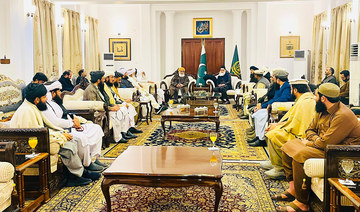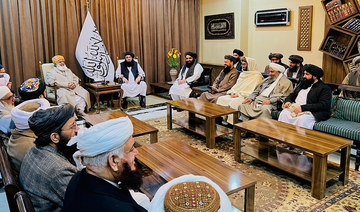ISLAMABAD: The government distanced itself from the visit of a prominent Pakistani religious cleric to Afghanistan on Thursday, saying it was not interested in dialogue with a proscribed militant network launching cross-border attacks against its civilian population and security forces from the neighboring state.
The statement focusing on Maulana Fazlur Rehman’s Kabul visit on the invitation of the interim Afghan government was issued by foreign office spokesperson Mumtaz Zahra Baloch during the weekly media briefing in Islamabad.
Rehman took a private delegation to Afghanistan on Sunday to hold talks with Taliban officials at a time when the ties between the two states are at their lowest ebb due to the rising number of militant attacks in Pakistan.
The Pakistani cleric advocated for strong bilateral relations between both countries against the backdrop of his country’s decision to deport large numbers of “illegal immigrants,” mostly Afghans, in the wake of a surge in deadly suicide bombings.
The government has urged the authorities in Kabul to prevent the militant network, Tehreek-e-Taliban Pakistan (TTP), from using the Afghan soil to launch attacks in its border areas and cities. It also suspect the involvement of unregistered Afghans in such violent activities.
Pakistan’s foreign office distanced itself on Thursday the government was not supporting the visit of a prominent religious leader of the country to Afghanistan while emphasizing it had no interest in opening yet another dialogue with a proscribed militant network in the neighboring state which is said to be responsible for carrying out attacks on civilians and security forces across the country.
“Maulana Fazlur Rehman has gone to Afghanistan in a private capacity,” Baloch told the media in response to a question. “The government is not supporting his visit in any way. Pakistan is not interested in dialogue with the TTP which has carried out several attacks in the country.”
She acknowledged the foreign office briefed Rehman about the situation in Afghanistan before his visit, adding it was a normal procedure.
“Our demands from Afghanistan have not changed,” she continued. “We want action against terrorist groups, including the TTP, in Afghanistan. We want the elimination of safe havens for terrorists in Afghanistan. And we want to prevent the use of Afghan territory for terrorism against Pakistan.”
According to a statement released by Rehman’s Jamiat-e-Ulama-e-Islam (JUI-F) party a day earlier, he held meetings with top officials in Kabul during his visit to Afghanistan.
The statement also maintained Rehman was optimistic about the future trajectory of Pakistan’s bilateral relations with Afghanistan.
The Pakistani cleric enjoys close relations with the Taliban leadership in Afghanistan since his party has also been advocating for Islamic laws and values.
The JUI-F also wields considerable influence in Pakistan’s Khyber Pakhtunkhwa and Balochistan provinces, both bordering Afghanistan.
Government rejects talks with Pakistani Taliban, distances from cleric’s Kabul visit amid bilateral tensions
https://arab.news/9am85
Government rejects talks with Pakistani Taliban, distances from cleric’s Kabul visit amid bilateral tensions
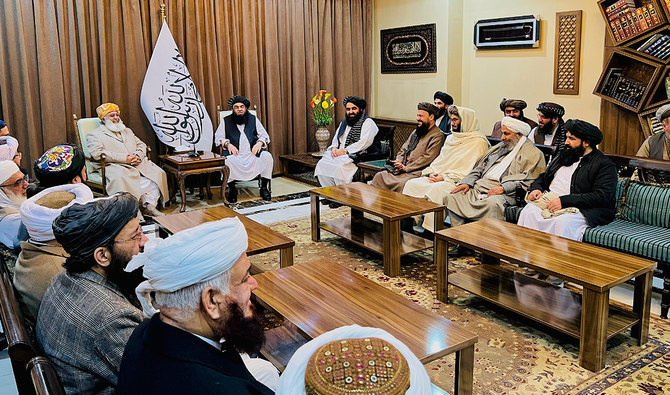
- The foreign office acknowledges briefing Maulana Fazlur Rehman about Afghanistan’s situation, calls it normal procedure
- Mumtaz Zahra Baloch says Pakistan wants the administration in Kabul to take action against ‘terrorists,’ their safe havens
US returns 133 stolen artifacts to Pakistan valued at $13 million
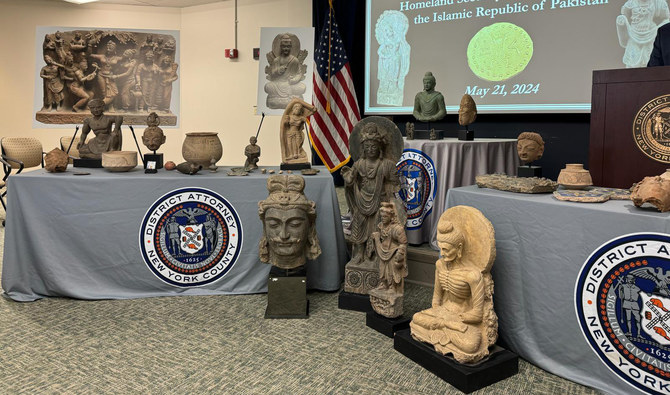
- illegal antiquities trade is a multi-billion-dollar global industry, as per a 2018 report by Standard Chartered
- This marks fifth such transfer between US and Pakistan, from where artifacts dating to Gandhara period were stolen
ISLAMABAD: The United States this week returned 133 pieces of stolen antiquities valued over $13 million to Pakistan, state-run media reported, marking the fifth such transfer to the South Asian country from where artifacts dating back to the Gandhara period were stolen.
Artifacts are man-made objects, such as pieces of art or tools, that are of particular cultural, historical, or archaeological interest.
The illegal antiquities trade is a multi-billion-dollar global industry according to a 2018 report by Standard Chartered Bank. The trade is also often a major funding source for criminal and militant groups on the supply side, according to a report by the Organized Crime and Corruption Reporting Project (OCCRP).
“The United States returned to Pakistan 133 pieces of stolen antiquities worth over $13 million at a ceremony at the Manhattan District Attorney’s office in New York on Tuesday,” the state-run Associated Press of Pakistan (APP) reported.
Some of the antiquities were displayed during the ceremony at which Pakistani Consul General in New York Aamer Ahmed Atozai said the artifacts would adorn museums across Pakistan.
“The consul general also signed an agreement with the Assistant District Attorney in Manhattan, Matthew Bogdanos, who heads the Antiquities Trafficking Unit for the repatriation of the returned artifacts to Pakistan,” APP said.
Bogdanos said he was delighted to return “glorious pieces of Pakistani heritage” to the country whose civilization dates back to 5,000 years, APP said.
Pakistan and the US regularly collaborate to return stolen artifacts to Pakistan. In 2021, the US, after conducting a probe into an Indian-American art dealer Shubash Kapoor, had returned 192 stolen antiquities worth around $3.4 million.
In August 2022, the US again returned 104 artifacts valued at $3.3 million to Pakistan that were among thousands of antiquities looted from Asian countries and seized from Kapoor.
Rain washes out England-Pakistan T20 opener
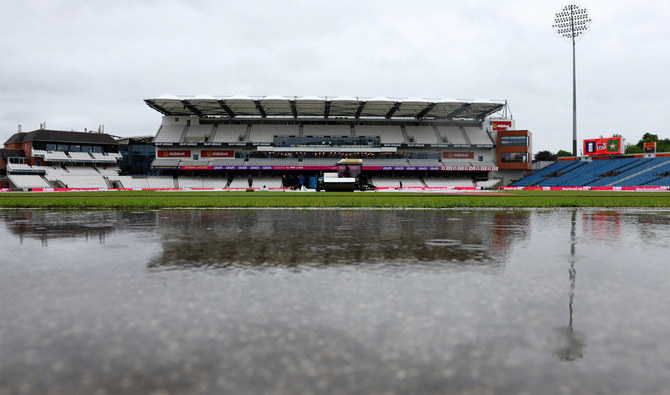
- Match was supposed to be launchpad for England’s defense next month of T20 World Cup title
- Both teams will now meet each other on Saturday at Edgbaston in second of four-match series
Leeds, United Kingdom: Persistent rain saw the first Twenty20 international between England and Pakistan at Headingley on Wednesday abandoned without a ball being bowled.
The match was meant to be the launchpad for reigning champions England’s defense next month of their T20 World Cup title in the Caribbean and the United States.
But a heavy and lengthy downpour in Leeds led the umpires to call the game off approximately an hour before the scheduled 17:30 GMT start.
The four-match series against Pakistan, the team England beat to win the 2022 T20 World Cup final in Melbourne, will now continue at Birmingham’s Edgbaston ground on Saturday before games next week in Cardiff and at the Oval.
England were also the defending champions heading into last year’s 50-over World Cup in India but Jos Buttler’s men suffered a tame exit, losing six of their nine matches.
The Pakistan T20 series could see the return to international duty of England fast bowler Jofra Archer. Injuries have blighted the quick’s career, with elbow and back problems sidelining the 29-year-old from top-level cricket for 14 months.
Pakistani media regulator bans TV channels from airing news on ongoing court cases
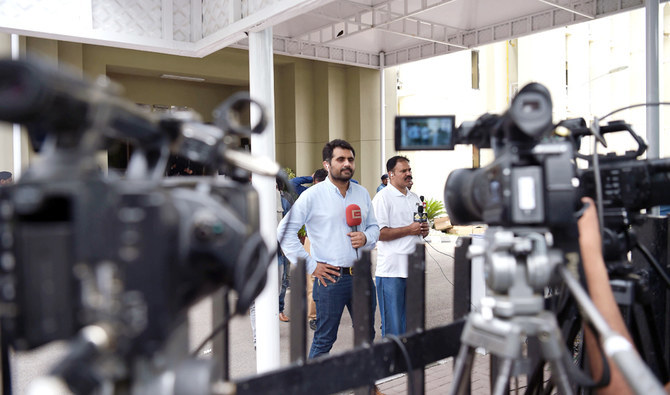
- Authority directs TV channels to report only written orders of courts, refrain from airing news related to court hearings
- Journalists’ associations reject directives, call on Pakistan Electronic Media Regulatory Authority to withdraw notification
ISLAMABAD: Pakistan’s media regulatory body has banned TV channels from airing news, opinions, and commentary on proceedings of ongoing court cases, prompting journalist associations on Wednesday to reject the directive and call it a violation of the country’s constitution.
The development takes place amid tensions between the government and the Islamabad High Court over the alleged kidnapping of Kashmiri poet Ahmad Farhad last week. The poet’s family has accused Pakistan’s Inter-Services Intelligence spy agency of abducting Farhad from his Islamabad residence for his critical social media posts that targeted the military.
Media extensively reported on the case’s hearings this week as the high court directed authorities to produce the missing poet within four days, warning it would otherwise summon senior government officials. The court also criticized Pakistan’s intelligence agencies, prompting the law minister to say on Monday that the court’s comments were “shocking.”
Journalists in Pakistan have spoken of growing press and media censorship, with many blaming Pakistan’s powerful military for illegally detaining journalists and torturing them. The military has repeatedly denied the allegations.
“TV channels are directed to refrain from airing tickers/headlines with regard to court proceedings and shall only report the written orders of the court,” a notification from the Pakistan Electronic Media Regulatory Authority (PEMRA) said on Tuesday.
The regulator also directed TV channels to air “no content including commentary, opinions or suggestions about the potential fate of sub judice matter which tends to prejudice the determination by a court, tribunal.”
However, PEMRA allowed TV channels to report on court proceedings if they were broadcast live by the judiciary.
Journalists’ associations covering Pakistan’s Supreme Court and the IHC rejected the directives, saying it was in violation of the country’s constitution.
“Both the journalists’ associations covering court proceedings reject PEMRA’s notification while terming it against press freedom and independent judiciary,” the Press Association of the Supreme Court (PAS) and the Islamabad High Court Journalists Association said in a joint statement on Wednesday.
“PEMRA has no legal right to ban coverage of court reporting,” the statement said, adding that the regulator’s notification was a “serious violation” of journalists’ rights enshrined in the constitution.
The associations demanded that PEMRA withdraw its notification, warning that they would otherwise challenge it in court.
Pakistan to enhance production of indigenous petroleum products— minister
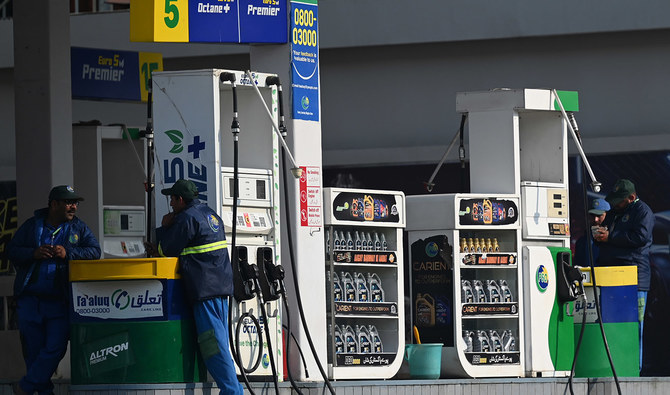
- Cash-starved Pakistan spends over $20 billion each year on petroleum imports to meet energy demand
- Pakistan welcomes foreign companies to invest in its oil and gas sector, says Petroleum Minister Musadik Malik
KARACHI: Pakistan wants to enhance the production of its indigenous petroleum products, Petroleum Minister Musadik Malik said on Wednesday, citing the financial burden that expensive crude oil imports have on the country’s fragile economy.
Cash-strapped Pakistan relies heavily on imported petroleum products as its energy demands grow. Struggling with a balance of payments crisis, high inflation and steep currency devaluation, Pakistan is looking to secure cheaper energy imports and find alternate ways to lessen the cost of power generation.
According to the Trade Development Authority of Pakistan (TDAP), the country’s indigenous oil production meets only about one-fifth of Pakistan’s current oil needs. The rest is met through high-cost imports.
Prime Minister Shehbaz Sharif has urged the government to turn toward renewable energy resources. Last month, he said the country currently imports oil worth $27 billion to meet its power and transportation needs, which puts a strain on the cash-strapped nation.
Speaking at the Pakistan Energy Symposium, Malik said it would be difficult to manage the country with such a huge energy import bill when Pakistan’s exports were around $30 billion.
“We want to first of all, produce as much of the petroleum products, including gas and crude, indigenously as much as possible,” the minister said, adding that the government has put blocks for bidding and is actively trying to attract global players in exploration activities.
Malik said the government is expediting oil and gas exploration within the country, adding that it welcomes foreign companies to invest in the sector.
“So, we are telling the world that Pakistan is open for business, our regulatory process, particularly the petroleum concession process is very dense and opaque,” he said.
He said investment processes and information about oil and gas exploration have been digitized and simplified to facilitate the government’s aims to enhance indigenous production of energy resources.
Malik advocated for increasing the utilization of Pakistan’s abundant renewable energy resources, pointing out that the country’s solar energy costs have significantly decreased.
PM Sharif demands industry status for Pakistan’s gemstones sector
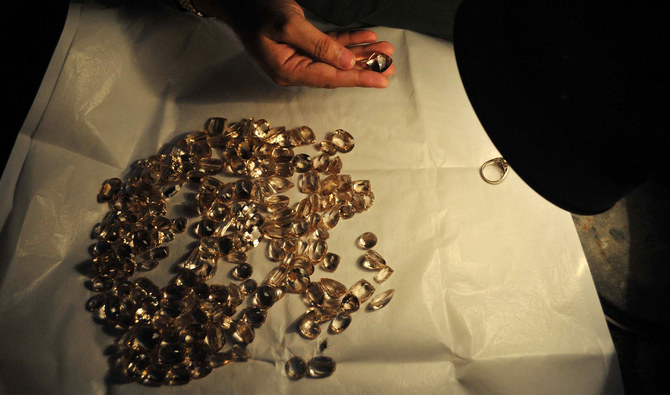
- Pakistan’s exports of gems and precious stones to China saw 47 percent increase in 2023, as per official figures
- Pakistan possesses immense natural resources in KP, Gilgit-Baltistan and Azad Kashmir regions, says Sharif
ISLAMABAD: Prime Minister Shehbaz Sharif on Wednesday stressed developing the country’s gems and precious stones sector, urging authorities to take steps to accord it the status of an industry, a statement from his office said.
According to a report by Pakistan’s Ministry of Commerce, the country’s exports of pearls and precious stones to China saw a 47 percent increase in 2023, showcasing the rising demand for Pakistan’s precious stones in China.
“The prime minister gave directions for steps to be taken for the gems and precious stones sector be granted industry status,” the PMO said, as Sharif chaired a meeting of the gems and private stones sector in Pakistan’s capital on Wednesday.
Sharif said Pakistan possesses immense natural resources, particularly in the regions of Khyber Pakhtunkhwa, Gilgit-Baltistan, and, Azad Jammu and Kashmir. He called on authorities to properly utilize these resources to Pakistan’s advantage.
“Efforts should be made to obtain international certifications for precious stones and the products made from them, and to ensure Pakistani representation in global exhibitions,” the prime minister said.
He directed necessary consultations to be held with the private sector and provinces in this regard.
Separately, the prime minister also presided over a meeting on Information Technology Parks, directing the construction of Islamabad IT Park “as soon as possible.”
The Islamabad IT Park is expected to act as a state-of-the-art facility that would aim to foster collaboration, innovation and product development in teh capital.
“The establishment of IT parks to promote IT, increase IT exports, and provide facilities to startups is a welcome development,” PM Sharif was quoted as saying by the PMO.
Sharif was told during the meeting that the Islamabad IT Park would be completed next year in collaboration with South Korea.
“The Islamabad IT Park will feature startups, incubation centers, banks, restaurants, and other facilities,” the statement said.





